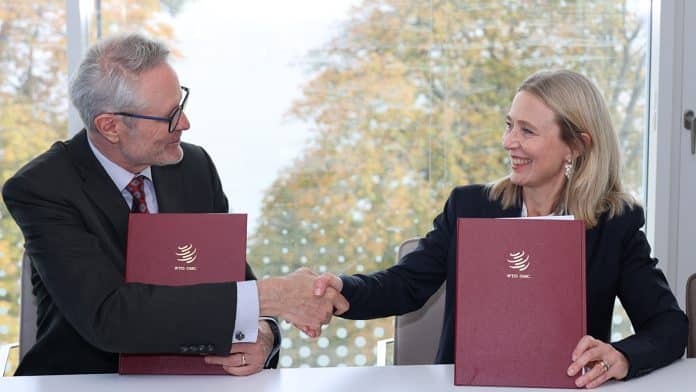Sweden is contributing SEK 30 million (approximately CHF 2.4 million) to the Standards and Trade Development Facility (STDF) from 2024 to 2026 to help developing economies and least developed countries (LDCs) meet international food safety, animal and plant health standards for trade.
The contribution was confirmed at a signing ceremony on 7 November attended by Ambassador Nina Tornberg of Sweden and the WTO‘s Financial Controller at the Finance and Corporate Services Division, John Breckenridge.
WTO Director-General Ngozi Okonjo-Iweala said: “We thank Sweden for its continued generosity and commitment to the STDF, and to improving people’s lives through trade. For two decades, the STDF’s global partnership has successfully provided pathways to trading safely, enabling communities around the world to use trade to sustain inclusive development and growth. STDF’s support has helped small-scale producers in Africa, Asia and the Pacific, Latin America and the Caribbean meet standards and start exporting to regional and international markets, contributing to higher earnings and job creation, including for women and youth; supporting poverty reduction and food security; and creating ‘win-wins’ for development and the environment.
Stregthens access to food markets
Sweden’s Minister for International Development Cooperation and Foreign Trade, Benjamin Dousa, said: “STDF’s work to strengthen farmers’, producers’ and traders’ access to international food markets helps boost food security by facilitating trade flows while offering the potential to improve income opportunities for communities. Supporting and strengthening the synergies between trade and development cooperation is a key part of the Swedish Government’s reform agenda for development assistance and STDF’s work is well aligned with this objective”.
The donation underscores Sweden’s commitment to the STDF’s mission, bringing its total contributions to approximately CHF 17.86 million since 2005. Sweden has contributed CHF 66.5 million to WTO trust funds over the past 22 years.
The 2024-2026 contribution will be used to strengthen the ability of small-scale farmers, producers and traders to gain and maintain access to markets for food and agriculture products through the development and roll-out of collaborative and innovative projects to strengthen SPS capacity, knowledge sharing, and monitoring and evaluation of results.
Sweden’s long-standing collaboration has been key over the years to promote the economic inclusion benefits of STDF’s work, which has contributed to increasing capacity in developing economies through contributions to legislation, strategies, structures, and SPS-related processes, as well as improved implementation of trade-focused measures for food safety, plant, and animal health.
Stronger export growth
Target economies and sectors – including micro-, small- and medium-sized enterprises (MSMEs) – that have benefitted from STDF support have seen stronger export growth in plants, animals and foods. STDF projects have also contributed to enhancing sustainable economic growth and climate change resilience.
Together with other donors, Sweden has driven work to mainstream cross-cutting issues focused on gender and environment, which enables STDF’s work to achieve stronger and more sustainable results. In addition, Sweden is actively contributing towards developing the next STDF strategy for 2025-2030 and strengthening STDF’s Monitoring, Evaluation and Learning Framework with a view to further improving its performance and impact.
The STDF is a global multi-stakeholder partnership facilitating safe and inclusive trade, established by the Food and Agriculture Organization (FAO) of the United Nations, the World Organisation for Animal Health (WOAH), the World Bank Group, the World Health Organization (WHO) and the WTO, which houses and manages the partnership. The STDF responds to evolving sanitary and phytosanitary needs, drives inclusive trade, and contributes to sustainable economic growth and food security, in support of the United Nations’ Global Goals.




